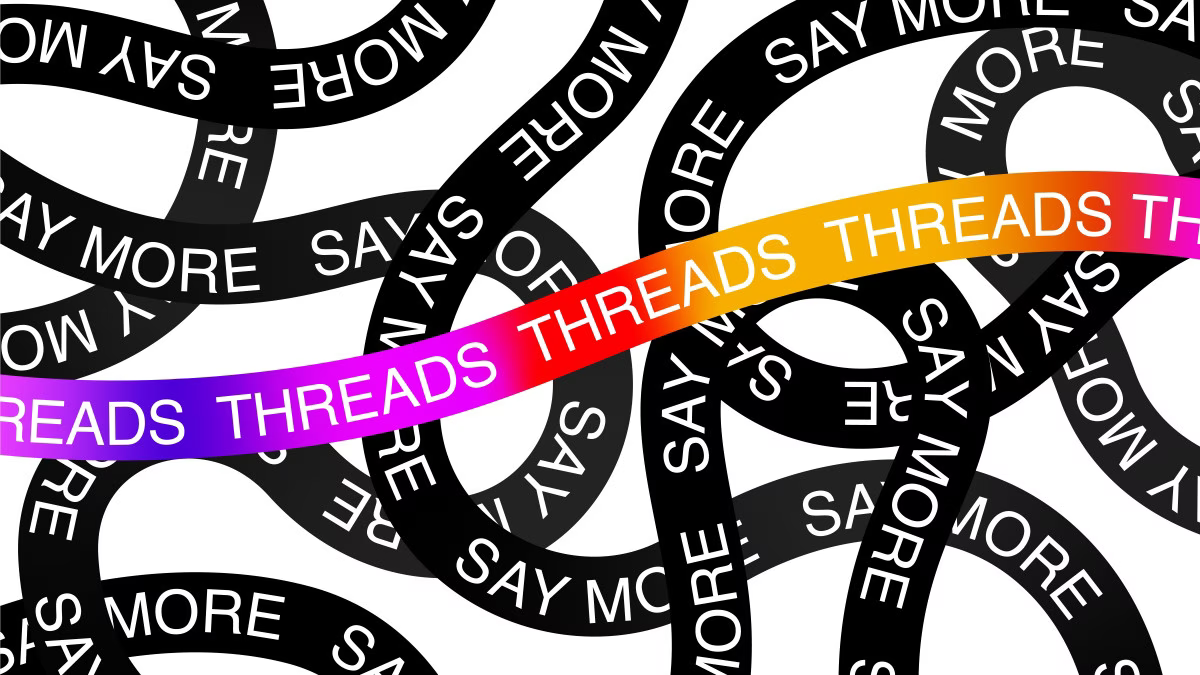After an explosive launch in early July that saw 150 million sign-ups within the first week, Threads has struggled to maintain its trajectory. But that doesn’t mean the platform is unravelling — far from it. Threads occupies a unique space on the social media grid, especially when considering the other apps in Meta’s portfolio, and is well-positioned for long-term growth.
Needle, meet haystack
In its launch post, Meta positioned Threads as a ‘a new app, built by the Instagram team, for sharing text updates and joining public conversations.‘ The point about Instagram is important but let’s come back to that. The focus on ‘text updates‘ and ‘joining public conversations’ is what really sets Threads apart.
With other social platforms competing to win the battle for short-form video (and Gen Z attention) Threads stands alone as an app that’s largely oriented around text-based discussions, with algorithmically-driven feeds to surface new content. As such, Threads has the bottom-right quadrant of the social media grid all to itself.
3 outta 4 ain’t bad
Looking at other Meta properties, the company now can stake claim in ¾ of the map. With Facebook — which started in the lower left focused on text — Meta has a platform for video-forward content still largely organized around friends and followers. With Instagram, Meta has an image and video platform that is moving more quickly towards a feed built on algorithmic recommendations. And, with the recent update to create a Following feed on Threads, it’s possible it may be able to grab some of the lower left area too.
By launching Threads through Instagram, Meta was able to drastically remove barriers to entry that other new apps face to attract new users, and instantly infuse a social graph to surface content within the platform. In other words, neither the app nor its users had to start from scratch. This provided an incredibly massive advantage and it will be interesting to see if other social platforms take note and launch new apps off the backs of their existing ones.
X marks the spot
Speaking of other apps, the company formerly known as Twitter has been moving quickly to shed its skin as a text-based app for engaging with people you follow — aka lower left quadrant. It’s now firmly planted in the top right, with a focus on video (short and long-form) and a feed that populates content from seemingly everywhere. Of course, Twitter changed its name to X, but stopped short of spinning off a new app. With Elon Musk’s vision for X, it’s possible the app will zoom right off the grid from social media into a far broader landscape, one which includes everything from payments to marketplaces.
A rolling stone
Looking at all the companies represented here on the grid, it’s interesting to note who has not moved over the years. TikTok, Snap, LinkedIn, Reddit, and Pinterest have pretty much all remained in the same space where they first launched, and have found ways to grow usage and revenue by sticking with their original value propositions. You could say wherever they laid their hat was their home.
It goes to show you don’t have to continually reinvent yourself to drive stakeholder growth. LinkedIn owns the professional audience by staying true to a predominantly-text format and connection-oriented graph. Meanwhile, Reddit maintains its rabid user base by keeping content organized around topics, and communities that people can choose to engage with through text-based boards. So, both of these apps occupy the lower-left quadrant on the social media landscape, but are hardly complete unknowns.
In the top left you have Snap (the OG of vertical short-from video), and whilst it has incorporated aspects of algorithmic content through Discover, the main utility is organised around actual friends. Of course, the top right is TikTok territory with algo-driven video keeping its core base of users entertained for hours on end. And squarely in the middle, lays Pinterest, with images as the format du jour, and content surfaced from algos and followship alike. For each of these apps, wild horses couldn’t drag their users away.
Wild brandits
As for brands, when it comes to engaging through paid or organic social media, understanding the intricacies of each platform is the imperative. Don’t take a lazy one-size-fits all approach. Carefully consider the use-cases and audiences of each platform and create a bespoke strategy.
In the case of Threads, the time to test your way into the app is now. It won’t be long before ads appear on the platform and, with that, the ability to leverage data from other Meta apps for audience targeting and creative personalisation. Look for third-party ad tech platforms that can help you bridge across all the social apps and manage campaigns centrally.
At the end of the day, the social media landscape can sometimes feel like the Wild, Wild West. But it all breaks down neatly along the lines of format (ranging from text to video) and organisation of content — a spectrum from follower-based graphs to algorithms. Use this rubric to evaluate opportunities with various apps and apply the lens to new platforms as they pop up (or in the case of X, pop off) the grid.
Featured image: Threads logo

